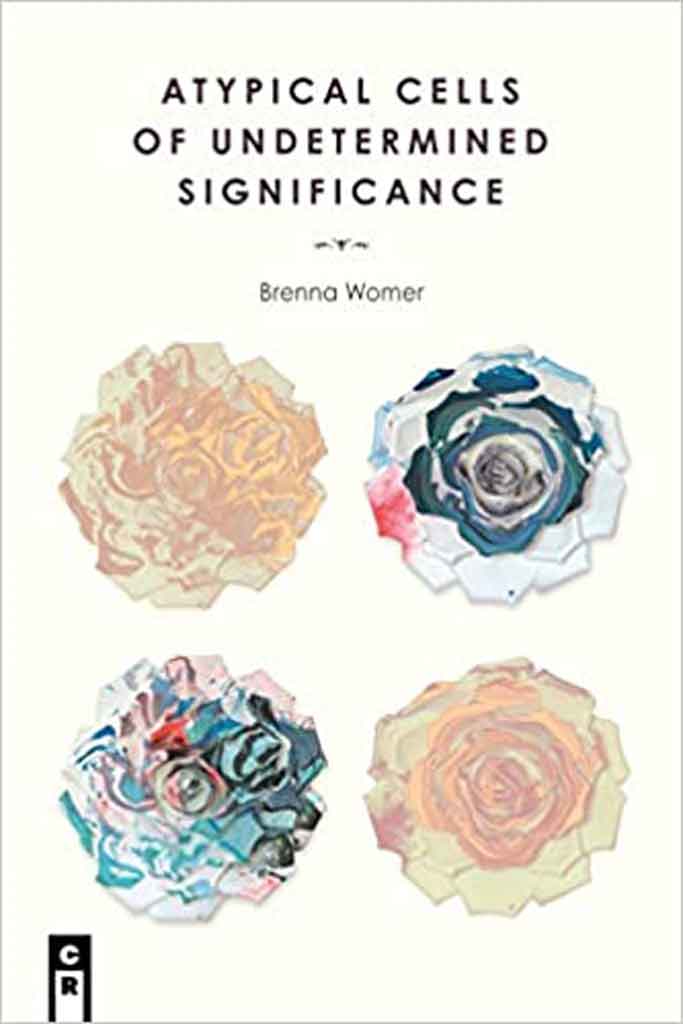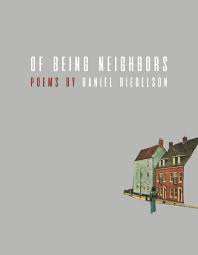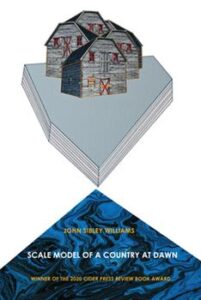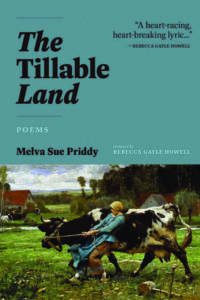Review by Shane Stricker // December 27, 2018
C&R Press
$10.00, pp. 54
Brenna Womer’s Atypical Cells of Undetermined Significance (C&R Press, 2017) unfurls like a person aging, unfolding, unraveling, becoming itself.
It is essay and poetry and lyricism in word and line and form choice.
It is voice.
One voice for the one who forgets what she was searching for only the night previous. “It’s true, I call my mother, drunk, to ask about/her god, but the next day/I don’t remember my questions, or her answers;/ I can’t recall the shape of the moon” (35).
One voice for the one who has a friend to give her a ride home. “The doctor asked okay, then paper cut./Paperweight on paper plate;/ she held the nurse’s hand./In the recovery room, no vinegar/or brown paper bag, but a cookie/for the sugar in her glass-paper blood./A friend drove her home to thick pads/papered over Hanes Her Way” (21).
One voice for the one who has felt nothing at all. “It was six pumps before, I’m coming—syllables flaking from his lips like soup crackers: Baby, baby, baby. When he rolled off me his dick slapped wet against my thigh, and he put his hand on mine. Smiling, sweaty, he said, You don’t wanna wait to clean up. It’ll run right out of you. The only thing I hadn’t expected was for it to feel like nothing at all” (39).
These voices come together to tell the story of one body. This body finds itself literally in the hands of misogyny as its introduced to readers in the first essay of this hybrid chapbook of poetry and prose. This body’s gynecologist, too concerned with his own comfort to notice the ways in which his conversation and the conversation forced from this body causes it to become secondary, answers a phone call in a moment of diagnosis. His body is jean clad. His body condescends. His mouth speaks, “Think of it like I’m making a salad in your vagina” (6). It’s unclear whether this doctor is one male or many—he’s not named, remaining an ever present he—but this he, his body, becomes the symbol of what the female body is up against throughout this chapbook: always already positioned by a culture that is violent to and dismissive of it to consider this body secondary even to the one who resides within it. Womer takes these moments of presence and locates the reader at the axis of revelation. These quick truths tell readers Womer will no longer be secondary in her own body.
Atypical Cells of Undetermined Significance is a dictionary of one’s life.
Becoming: “For the first time my life was mine and not something I was living to honor someone else with, and while that was exhilarating, it also instigated a passionate revolt against the life my mother and grandmother had settled into. I was—am—terrified of being owned. By a god or a man or a child or a place. By anyone or anything but myself” (10).
Condescension: “He draws a house and a stoop and a path to the front gate, to the curbside mailbox. He draws a stick figure one step down from the door. This is you, he says, pointing to the stick. The house is healthy, and the mailbox is cervical cancer. I’m trying to keep you from checking the mail. He hands me the drawing. For your fridge, he says (5-6).
Family: “I didn’t know the reasons she was sad was because she couldn’t bring herself to leave my father, and I didn’t know the reason she couldn’t leave him was because I loved him too much, loved him enough for the both of us. You were the glue” (12).
Love: “We were together for a summer, the first one he’d ever spent away from his two little girls who were downstate with their mother. He called her my ex on our first couple of dates and then Sally for a handful after that, but it wasn’t long before she was back to being Sal—a name I thought too endearing for someone he was trying not to love anymore” (34).
Maturation: “I want to be a mother before my daughter learns what she is to the world, before she gets angry at me for telling her the way things are, for breaking that beautiful spell as my own mother did. Before she spreads her legs for the first, the could-be, the why-won’t-you, the true, the broken, and the anything-to-fill-this-hole kinds of love. We are not princesses” (23).
The fusion of body to being is present throughout this stunning debut book. It seems to ask, over and again, how do I inhabit? And, then, it tells readers how to do this inhabiting. It must come from a rejection. It must come from an acceptance. It must come from a place of truth. The body of this book smells like flour and brewed coffee. Like gray November mornings. It smells like shamed woman who’s just had sex. Like blood and trapped butterflies, weed and tissue paper, vinegar, cookies, like the one who checks the body’s pulse and decides it is beating exactly at the rate it was always meant to.
This book rips and it tears again and again. It’s willing to explore the one given body as truth. Willing to own the everyday and that one specific day in 1999, that one in 2001, the other in 2003. What is a synonym for having a writer’s eye like a seam ripper? What is a synonym for the feeling that comes from hearing eggs break? The synonym for refusing to turn away? In these pages, Brenna Womer tears at her past. Explores her body and owns it a way that seems both an act of self-love and revolution. I will read these pages again. And the next piece she writes. And the one after. I believe you should too.
ABOUT THE REVIEWER
Shane Stricker holds an MFA from West Virginia University and is in his second year of coursework toward a PhD at the University of Tennessee. He was a 2016 fellow at the Writing by Writers Workshop at Tomales Bay. His work appears in The Anthology of Appalachian Writers, Midwestern Gothic, Moon City Review, and other magazines and journals.






